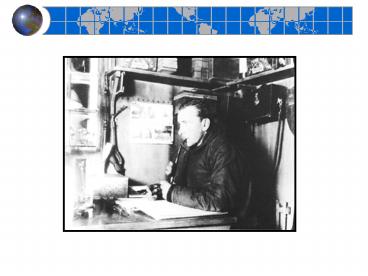Continental drift - PowerPoint PPT Presentation
1 / 16
Title:
Continental drift
Description:
... tectonics ... Evidence for plate tectonics. Earth's magnetic field affects all ... a high degree of tectonic activity (mountain building, earthquakes, ... – PowerPoint PPT presentation
Number of Views:2167
Avg rating:3.0/5.0
Title: Continental drift
1
(No Transcript)
2
Continental drift
- Alfred Wegener, a German meteorologist and
geophysicist, was the first to advance the idea
of mobile continents in 1912 - Wegener identified several lines of evidence to
support the idea that the continents had drifted
3
Evidence for continental drift
- Matching coastlines on different continents
Figure 2-2
4
Evidence for continental drift
- Matching mountain ranges across oceans
300 million years ago
Today
Figure 2-4
5
Evidence for continental drift
- Glacial ages and climate evidence
Figure 2-5
6
Evidence for continental drift
- Distribution of fossils such as Mesosaurus
Figure 2-6
7
Objections to the continental drift model
- Wegener envisioned continents plowing through
ocean basins - Wegener did not provide a plausible mechanism to
explain how the continents could have drifted
apart - Most Earth scientists rejected continental drift
because it was - Too far-fetched
- Contrary to the laws of physics
8
The theory of plate tectonics
- Continental drift was reexamined in the 1960s
when new information became available - Sea floor features became better known
- A technique was developed that enabled scientists
to determine the original positions of rocks on
Earth (paleomagnetism)
9
Evidence for plate tectonics
- Earths magnetic field affects all magnetic
objects on Earth
Figure 2-7
10
Evidence for plate tectonics
- When rocks cool at Earths surface, they record
Earths magnetic field (normal or reversed
polarity)
Figure 2-9
11
Evidence for plate tectonics
- Paleomagnetic studies indicate alternating
stripes of normal and reverse polarity at the
mid-ocean ridge - Pattern was created by sea floor spreading
Figure 2-11
12
Evidence for plate tectonics
- Harry Hess envisioned new sea floor being created
at the mid-ocean ridge and destroyed in deep
ocean trenches
Figure 2-10
13
Evidence for plate tectonics
- Age of the sea floor matches pattern predicted
by sea floor spreading - Youngest sea floor is at mid-ocean ridge
- Sea floor is older with increasing distance from
mid-ocean ridge
Figure 2-12
14
Evidence for plate tectonics
- Pattern of worldwide earthquakes (left) matches
plate boundaries (right)
Figure 2-13
15
Earth structure
- Chemical composition
- Crust
- Mantle
- Core
- Physical properties
- Lithosphere
- Asthenosphere
- Mesosphere
- Outer core
- Inner core
Figure 2-14
16
Principles of plate tectonics
- The outermost portion of Earth is composed of a
mosaic of thin rigid plates (pieces of
lithosphere) that move horizontally with respect
to one another - Plates interact with each other along their edges
(called plate boundaries) - Plate boundaries have a high degree of tectonic
activity (mountain building, earthquakes, active
volcanoes)
17
The 3 types of plate boundaries
- Divergent
- Convergent
- Transform
Figure 2-17
18
- Good Links
- Surface of Earth 2 minute color relief images
- http//www.ngdc.noaa.gov/mgg/image/2minrelief.html
- Predicted seafloor bathymetry (topography
underwater) - http//www.ngdc.noaa.gov/mgg/announcements/announc
e_predict.html - Visualizing Data
- http//www.ngdc.noaa.gov/mgg/image/images.html
- IRIS Home page
- http//www.iris.edu/about/ENO (Education and
outreach)































